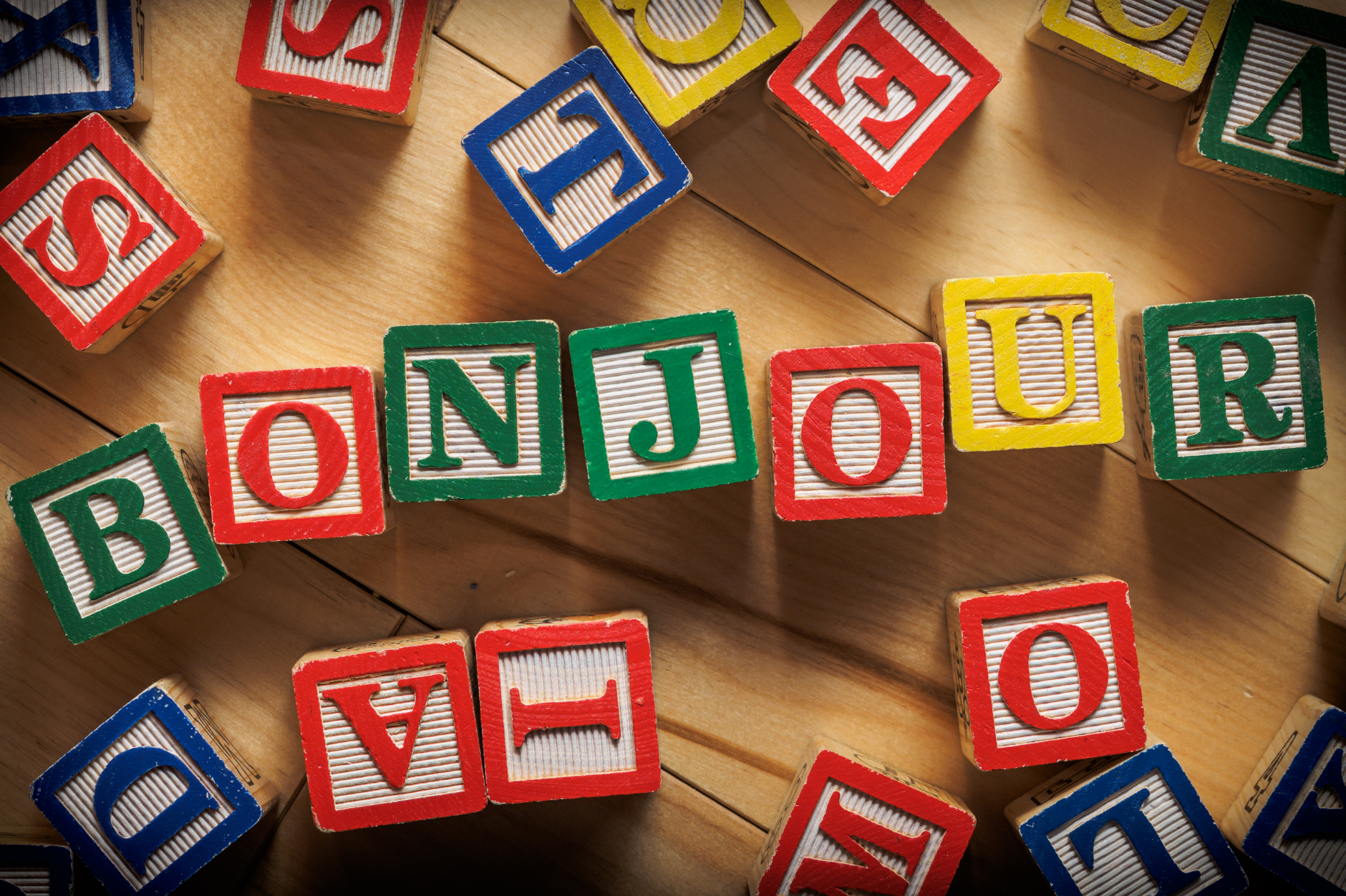Different Ways to Greet People in French
Posted by Josh on 8th Aug 2022 in the blog in the learning french category
Bonjour!
Or should that be ‘Bonsoir’? Or 'Salut', or even ‘Coucou’?
Confused? Don't worry — we've got you covered.
Just like in English, there is more than one way to greet people in French. But knowing which word or expression to use, and when to use it, can be quite tricky! There are different things to consider, such as who you're talking to, the circumstances in which you're meeting, and what time of day it is. But once you learn them, it's easy to get the hang of it, and even easier to put them into practice.
Being able to speak and understand a range of different greetings is incredibly important. You need them almost every time you meet someone, answer the phone, or enter a shop — to mention just a few examples. In the course of a single day in France you’re likely to encounter many of the expressions in this list.
You can find out even more ways to greet people in French in Lesson 01 of the Complete French Course.
Bonjour
If you only know one word in French, it’s probably going to be ‘bonjour’. While it’s the closest equivalent to ‘hello’ in English — insofar as it's the most common way to greet people — it is a somewhat polite word which literally translates as ‘good day’. You can therefore say 'Bonjour' during the morning or throughout the day.
But be careful: there are different variations of 'bonjour' for different times of the day (or night), so it's handy to learn them all if you're planning on spending more than a few hours in France!
Bonsoir
‘Bonsoir’ means ‘good evening’. Once it starts to get dark — or 6 p.m. as a general rule of thumb — it's time to put 'Bonjour' to bed and start using ‘Bonsoir’ instead.
Bonne Nuit
When you want to say ‘Good night’, say ‘Bonne nuit.’ Watch out though: unlike 'Bonsoir' and 'Bonjour' — which are one word when used as a greeting — ‘Bonne nuit’ is always two words, as 'nuit' is feminine, and so the adjective 'bon' needs to agree with the noun.
Bon après-midi
‘Bon après-midi’, (or 'Bonne après-midi'; it can be masculine or feminine) meaning ‘Good afternoon’, is not only the longest of the ‘bon’s, at two and a half words — it’s also the least common. This is partly because it’s a slightly longer expression, but most likely it's because you can also say 'Bonjour' during the afternoon. Nonetheless, 'Bon après-midi' is useful for when you want to give a more time-specific greeting, and especially when your afternoon is going better than your morning!
Rebonjour
You're probably already familiar with the prefix 're-' in English, indicating a repeated action. It works exactly the same way in French: 'revenir' is to 'venir' what 'revisit' is to 'visit'.
With this in mind, you can probably figure out what 'rebonjour' means: 'Good day...again!' It’s a helpful word for when you’re encountering someone for the second time in one day. Unlike many 're-' words, it doesn’t have an equivalent in English, so it’s a wonderful way to impress your French friends — assuming you've already said 'bonjour' to them recently!
Salut
‘Salut’ is an informal way of saying ‘Hello’, a bit like 'Hey' or 'Hi'. That means you'd be more likely to say it to your friends than your boss or you teacher. It can also mean ‘goodbye’, but again, only in informal situations. You may also encounter ‘salut’ as a noun, in which case it means a 'greeting' or a ‘wave’.
Comment ça va ?
Unlike the other greetings on this list, ‘Comment ça va ?’, meaning ‘How’s it going?', is also a question. So while it can be used as a greeting on its own, it can also be used as a follow-up after saying 'Salut', 'Bonjour' or another single-word greeting. If someone asks you ‘Comment ça va?', you can say 'Ça va bien, et toi ?' ('It's going well, and you?').
Ça va ?
Sometimes French speakers will drop the ‘comment’ and simply say ‘Ça va ?’. It literally means 'it goes', but in this context means the same thing as 'Comment ça va ?' ('How's it going?'). Be careful though — ‘ça va’ can also be an answer to the same question, and in this case means 'it's going well'. Listen out for the intonation — if the 'va' is spoken at a higher pitch than the 'ça', it's probably a question.
Comment vas-tu ?
While ‘Comment ça va’ means 'How’s it going?', ‘Comment vas-tu ?’ means 'How are you?'. Although the object of both expressions is different, they mean more or less the same thing, but if someone asks you this, you’ll need to give a response that refers to yourself ('tu') rather than it ('ça'). Try 'Je vais bien' instead of 'Ça va bien'.
Comment allez-vous ?
When you want to ask ‘how are you?’ to a group of people, or to someone older or in a position of more authority than yourself, use ‘comment allez-vous ?’ instead of ‘comment vas-tu ?’
Allô
A phonetic spelling of ‘hello’ in French, you may recognise it from the famous British sitcom Allo Allo, set in France during the Second World War. Of course the expression predates both the show and the war, and is a rare example of a French word derived from English, rather than the other way round.
When the telephone was invented, it became a convention across the world to use the word 'Hello' to acknowledge that you had picked up the receiver. As a result, you'll usually only hear the word 'Allô' in French when you're on the phone, and very rarely see it written down. Note that sometimes it is spelt with a circumflex over the 'o', and sometimes without — both are correct.
Coucou
‘Coucou’ is probably the most casual and affectionate way to say 'Hey' or ‘Hi’ in French. It originally meant ‘peekaboo’, and can still be used in that way. Adults will often say ‘Coucou’ to greet small children.
Enchanté(e)
While not exactly a way of saying ‘Hello’, ‘Enchanté’ (if the speaker is male) and 'Enchantée' (if the speaker is female) are important pleasantries to have at hand when meeting someone for the first time. For instance, if someone introduces you to a stranger, a simple handshake or 'bise' (cheek-kiss) with the word 'Enchanté' is all you need to greet them politely. It will come as no surprise to learn that the word literally means ‘enchanted’, but it is unlikely you would say that in English. Think of it more like the expressions ‘It’s a pleasure’, or ‘Nice to meet you.’
Check out some of our other blog posts!
The best places to visit in France (that you probably haven't heard of)
Posted on by Josh in the french culture categoryEveryone knows Paris, Nice and St Tropez...but France is full of beautiful and often underappreciated places. On your next trip, why not pay a visit to one — or all — of these hidden gems?
Read moreFrench mythological beasts you haven't heard of
Posted on by Yasmin in the french culture categoryTo keep the spooky energy alive for a little bit longer following Halloween, here's a new blog about three absolutely bone-chilling mythological beasts that originate from France. Who knew such a romantic country could have such a dark twist to its folklore...
Read moreHave fun learning French Today
People from all over the world enjoy learning French with Alexa Polidoro’s popular French audio and video lessons.





